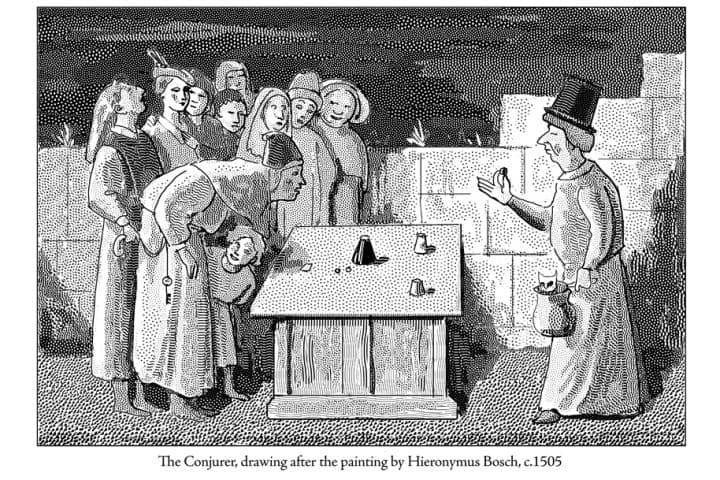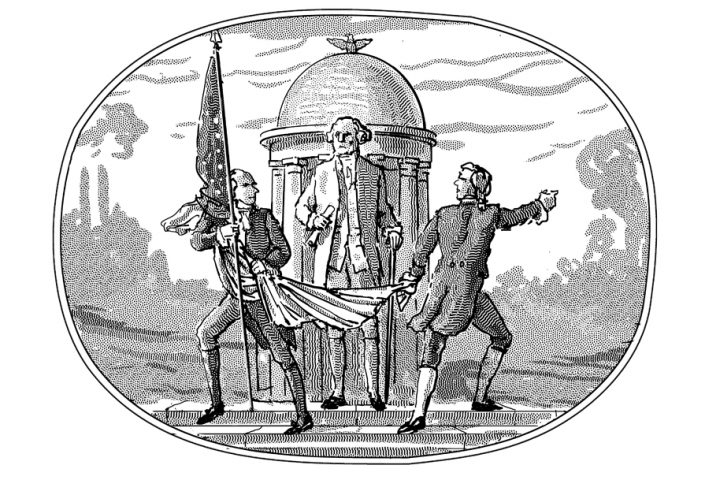Books Reviewed
No matter how grand or cosmic an event, individual human lives remain the criterion of meaning on this earth. History “always posits more time, backwards and forwards,” John Updike once wrote, so “in that respect it is less serious than a single, non-extendable life.” Humans’ efforts to comprehend and dignify historical events will always incline toward interpretations that are essentially biographical.
Suppose, however, that a life is consumed by apparently insignificant pursuits. Can that story convey something more serious? This question haunts Misbehaving: The Making of Behavioral Economics, a professional autobiography of University of Chicago economist Richard Thaler. A recent president of the American Economic Association, Thaler is one of the figures who brought behaviorism to economics over the past 40 years. Misbehaving chronicles Thaler’s not-so-uphill climb within the academic economics profession, during which he helped displace “efficient-market theory” with the social psychology of the benevolent expert’s “nudge.”
Thaler is easy to read—a compliment few economists since the era of John Kenneth Galbraith and Milton Friedman have earned. He recalls overhearing a friend once say that “the best thing about Thaler, what really makes him special, is that he is lazy.” Thaler concludes the reason laziness might be advantageous is that it means he examines only “things that are interesting, at least to me.”
* * *
Misbehaving is not deeply fascinating or important, but interesting in the way that a small anomaly can capture our attention, especially when related in Thaler’s droll, direct fashion. People will drive across town to save $10 on an electronic device that costs $50, he observes, but will not do the same to save $10 on one that retails for $500. Odd—ten bucks is ten bucks. College kids given coffee mugs from the campus bookstore as part of a classroom experiment will not part with them for $6, even though a) this junk fell out of the sky, and b) had they desired these items before receiving them, $6 is the going price at the store just steps away. Weird. A fellow who’ll drink wine from his own collection would never dream of buying the same vintages at current prices of $100, in a market into which he could easily sell. Peculiar.
Can observing things so insubstantial, and discerning their deeper motives and patterns, fuel an important career? Yes, the anomaly at the heart of Misbehaving’s story. Thaler’s behaviorist theory, advanced also by a handful of colleagues, upended the central verity of modern economics: people make a priority of maximizing their economic circumstances. Behaviorist economics has shown, to the contrary, that people have all sorts of proclivities, many of which leave them choosing to be worse off economically.
Misbehaving batters, at unnecessary length, the straw man of efficient-market theory. We never quite get a good explication of what this central theme of the “Chicago School,” as Thaler puts it, actually means. Thaler identifies fellow Chicagoans Merton Miller, Eugene Fama, and Casey Mulligan, and erstwhile Rochester colleague Michael Jensen, as all being flummoxed by his work. Because he does not do justice to his critics’ position, however, readers struggle to grasp what was at stake and why there was conflict.
* * *
Thaler skewers Jensen, who went on to become Harvard Business School’s top finance authority, for being a holdout for the old order. “It is difficult to express,” Thaler writes, “how dubious people were about studying the behavioral economics of financial markets.” He quotes Jensen: “I believe there is no other proposition in economics which has more solid empirical evidence supporting it than the Efficient Market Hypothesis.”
But beyond quoting a few taglines, Thaler declines to elaborate positions such as Jensen’s. As a result, he never confronts the possibility that his own career traded on making a distinction without a difference. In fact, efficient-market theory holds that odd personal preferences do prevail in economics. The point is that because these quirks cancel one another out, market prices end up just about where we would expect if people sought to “maximize utility,” to use the language and logic of the efficient-market theory. Thaler’s dismissive epithet, “the invisible handwave,” neither does justice to this position, nor establishes that behavioral economics ever embarked on truly original inquiries of phenomena that Chicago School economists had not already examined.
More than any other scholar in the field of finance, for example, Jensen has demonstrated that big firms’ decisions about money can be ludicrously bad for maximizing shareholder value. He once ranked the Fortune 500 in terms of how well or poorly its companies had disposed of profits in the 1980s. Dead last? In the Fortune 500 top three throughout the decade, General Motors devoted capital equal to the combined market value of Toyota and Honda to internal development that never bore fruit. As a result, legions of workers got paid for a decade’s worth of negative productivity. The main outcome, and effective purpose, was to sustain G.M. employees’ expectation that any and all would hold a job there for life. Michael Moore’s documentary, Roger and Me, got it exactly wrong, then: G.M. would have done better by its investors and employees if it had been less, not more preoccupied with job security.
In this fat land of ours, we employ many intellectuals at good salaries in universities famous and admired throughout the world. The irony shines through in Misbehaving. Thaler’s autobiographical labors invite the conclusion that the pioneers of the transformative field of behavioral economics have devoted their triumphant careers to minutiae. Since the finance cases are tangents, the examples generally get no better than experiments with coffee-mugs. Towards the end, Misbehaving gets bogged down in loving but pointless detail about the behavioral paradoxes of down-market European television game shows, not sparing us consideration of ones that are sexually suggestive.
As the book is wrapping up, Thaler suddenly announces that he has good ideas about something that really does matter, retirement savings. But this “news” is six years old: Thaler and Cass Sunstein’s bestselling Nudge (2008) argued that behavioral economics can prompt people to save more by tying raises to savings commitments.
An obvious point about the “irrationality” of saving little or nothing for retirement goes unmentioned. Saving for a distant future implies that money will hold its value, which is not a given in our era of Federal Reserve blowouts, and with the 1970s inflation a lingering memory. Moreover, saving for retirement in “tax-deferred” or “tax-free” accounts assumes that government will honor its promises about limiting taxes—also not a certainty, since the government is $19 trillion in debt and afflicted with a ravenous desire to spend and expropriate. In light of these well known facts, spending money on goods and services now may be highly “efficient,” the challenges of old age notwithstanding.
Nowhere in Misbehaving’s exuberant account of behavioral economics ascendant do we get the sense that government may have odd proclivities, that policy at its point of origin may suffer from anomalies at least as severe as any that reduce private-sector productivity. Rather, Thaler tells us that once behavioral economics got its sea legs in the 1990s and 2000s, its efforts “to make the world a better place” focused on incorporating its insights into public policies.
* * *
It’s a strange experience to read Misbehaving alongside Robert Gordon’s Rise and Fall of American Growth, one of the most discussed economics books of recent years. (Its length, however, guarantees it will be one of those books that is read far less than it’s discussed.) Gordon’s thesis, demonstrated exhaustively over 650 pages, is that living standards made their most extraordinary improvement in human history from 1870 to 1970 in the United States. It makes you wonder: If Thaler is correct that economics was wandering in the dark before the advent of behaviorism in the 1970s, perhaps the whole discipline is quite irrelevant to actual economic affairs. We can have, it would follow, unprecedented, exponential growth despite the obliviousness of the profession that exists to explain economics.
* * *
The Stanley G. Harris professor of the Social Sciences at Northwestern University, Gordon has written an endlessly fascinating book, a vast empirical history with little hint of biography. The engineering of window screens, to take an example, turned out to be decisive in the fashioning of growth: screens kept insects that had sampled a household’s backyard garbage and manure piles away from the family’s food, leading to quantum leaps in overcoming sickness and extending life. We think we know that the tenements of yore, themselves instances of imaginative engineering, were, as Gordon puts it, quoting William Blake, “dark Satanic.” In truth, they greatly increased amenable household space over what had generally served for shelter prior to the Civil War. Examples in this vein come by the hundreds, making the facts of American economic growth vivid and undeniable in a way no previous work has accomplished.
This richly informative work’s tragic flaw is the choice to de-emphasize the past, about which Gordon’s expertise is manifest, and instead stress the future, about which Gordon is, like everyone else, no expert. Urbanization, the conquering of infant mortality, increase in transportation speed, dramatic reduction in the size of the agricultural workforce, networking of the home (with heat, water, sewage, electric, and telephone systems), and decline of workplace danger “could happen only once,” we are assured incessantly. (“Could happen only once” happens six times in one paragraph.) Gordon’s corollary contention is that our century will, at best, see incremental economic and technological gains in the future. An alibi emerges: we shouldn’t blame our policymakers for slow growth, because slow growth is the best we can now hope for.
* * *
There are numerous, compelling reasons to reject this prognosis. Every transformation Gordon lists can happen again, which in a chapter on technology he comes close to proving without acknowledging. Perhaps urbanization cannot happen again, but moving back to the land can, at least figuratively. Technology currently implies that all of us may be able to grow our own food again, each yeoman cultivating his own garden under LED’s and enriched soils. Boom: a zillion agricultural workers, emergent under the auspices of a desirable economic gain.
The home cannot be networked again? Gordon is justly fascinated by the homely water closet, conducting as it did a hundred years ago fly-attracting, death-inducing waste far away from the household. Gordon must be aware that at present, a movement is afoot to reverse that process in the name of economic growth, to have waste linger in the home, in new hi-tech toilets that will diagnose the loamy stuff as to its progenitor’s diet and disease profile, then reuse it on-site in some clever, productive way.
Transportation “speeds” cannot be substantially increased? The advent of driverless cars means we stand at the cusp of replacing the vast amount of time we currently spend in traffic transfixed by talk radio with pursuits more suitable to us. Oddly, Gordon considers such prospects, indeed draws them out in fullness (as Thaler refuses to do with counter-arguments), but then declines to admit their plausibility and significance.
Gordon cites George and Ira Gershwin: the brothers’ enthusiastic songbook captured the spirit of the 1920s and ’30s, as incredible economic improvements took place, even despite the Depression. But Gordon does not push hard enough on one classic Gershwin line he quotes: “Our love is here to stay.” The previous line states, of course, that “in time the Rockies may crumble, Gibraltar may tumble, they’re only made of clay.” Ira Gershwin’s lyric captures that the human spirit and the earth’s ingredients are both here to stay. Given that the spirit has limits we can never know, ways to use the ingredients have limits we can never reach. If some aggregations of ingredients crumble, we’ll put the crumbs to good use. No final frontier to economic growth exists, or ever will.




